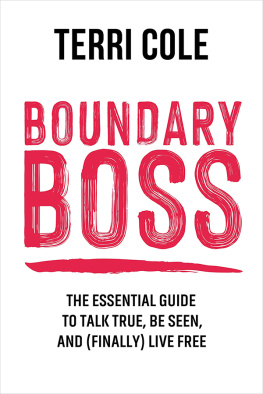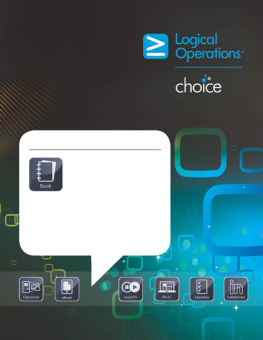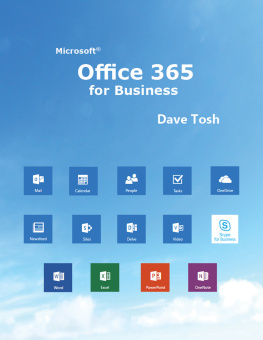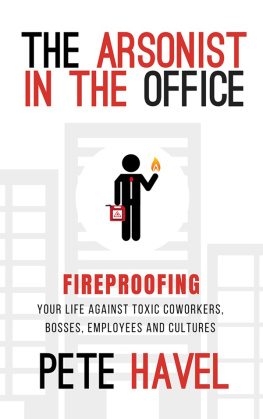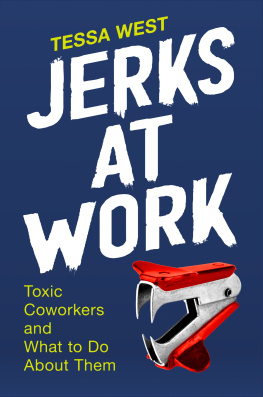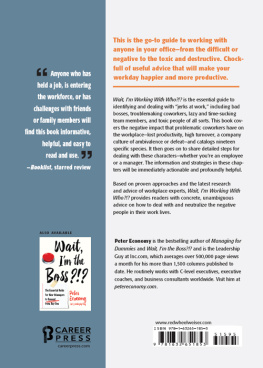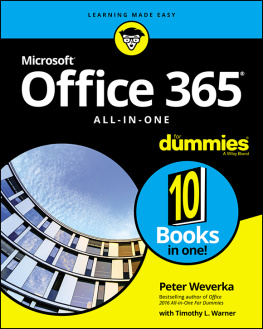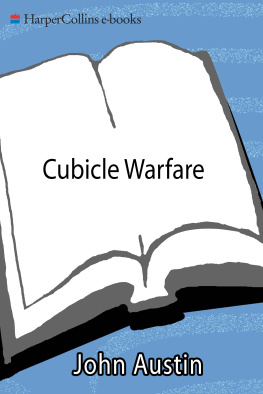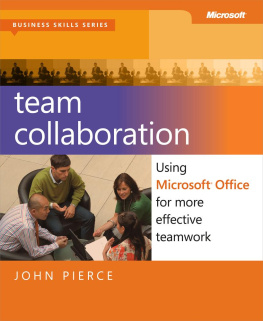CONCLUSION
BEING AN
AUTHENTIC LEADER
Our goal in this book has been to inspire you toward a drama-free officea productive and fun work environment where interpersonal issues are faced swiftly, problems are addressed collaboratively, individuals are appreciated, and successes are celebrated.
A drama-free office is made up of drama-free individualsstarting with you. When you chooseand its always a choiceto show up with curiosity, candor, courage, and appreciation, you encourage your coworkers to do the same. You become the inspiration for your boss, your partner, your cofounder, or a team member to catch the authenticity bug. Drama-free individuals forge nonjudgmental, drama-free relationshipsthe cornerstones of the drama-free office.
Individuals in drama-free relationships support one another in keeping agreements and hold one another accountable for commitments. They practice the disciplines outlined in this book to sustain clean, authentic interactions. They help each other avoid the dramatic behaviors (blaming, gossip, stonewalling, cynicism, resentment, enabling) that threaten to cripple almost every office. And when a colleague falters and falls into drama, they initiate the direct conversation that restores authentic connection and energy-enhancing collaboration.
Over time, others will observe how you and your authenticity allies model drama-free relationships. Somehopefully mostwill begin to shift out of their patterns of complaining, cynicism, controlling, and caretaking. Authenticity breeds authenticity.
But not always.
Regardless of how you behave, some of your associates, and perhaps your boss, might chooseagain, its their choice, even if unconscious or unacknowledgedthe false security and comfort of their dramatic behaviors. Authenticity carries the risk of vulnerability, betrayal, and embarrassment, and they might prefer the structure, sterility, and safety of a dramatic or transactional relationship.
Acknowledge and accept their choice while staying authentic with yourself and in your core relationships. Strive to remain understanding and compassionate toward your drama-prone colleagues without feeling obligated to rescue them. Accept, perhaps with sadness, the transactional nature of the relationship, and then manage their behavior. Many times, we have seen drama-laden people experience an authenticity epiphany simply by observingand inwardly envyingthe drama-free behaviors of their coworkers.
So, stay on course and commit to authenticity. You might never know the timing and extent of your impact on others. One of the best ways to sustain authenticity in your life is to adopt the mantras shown on page 184. They are the guideposts of a mature professional. Repeat them as often as necessary until they become second nature. Do this, and you will become the authentic professional your organization and the world needs.
MANTRAS OF AUTHENTIC PROFESSIONALS |
Adopt these mantras as the foundation of your own authenticity. |
DRAMA TYPE | AUTHENTICITY MANTRAS |
COMPLAINER | I am grounded and disciplined. |
I am strong and resilient. |
I get the job done. |
CYNIC | I am an enthusiastic motivator. |
I appreciate others gifts and perspectives. |
I am fully engaged. |
CONTROLLER | I am patient with others and myself. |
I embrace others beliefs and ideas. |
I take myself lightly. |
CARETAKER | I trust others to take care of themselves. |
I nurture myself. |
I am direct, decisive, and empowering. |
ALL DRAMA TYPES | I take full responsibility for whatever is happening in my life. |
I relate to others with candor and compassion. |
I embrace curiosity as the springboard for learning and personal growth. |
I choose collaboration to set the stage for synergy and creative solutions. |
APPENDIX A
MATURE RESPONSES
TO DRAMATIC PEOPLE
The following table presents the various dramatic personas often encountered in the workplace. Even with the best intentions to be drama-free, its easy to get triggered by their behaviors and fall into an emotion-driven reaction. Instead, choose the mature response shown in the table.
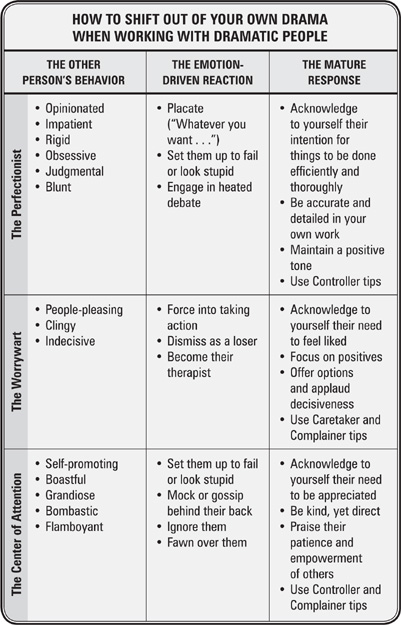
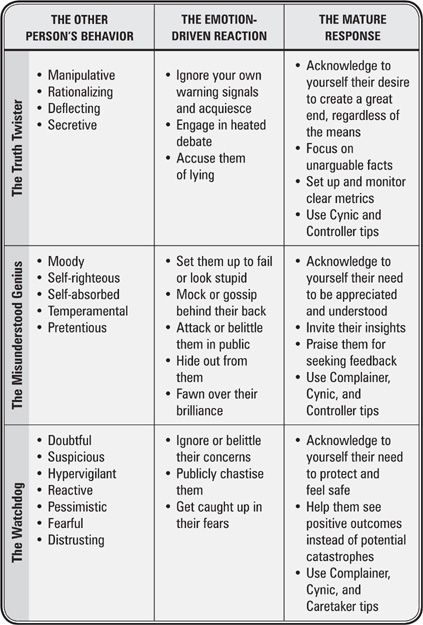
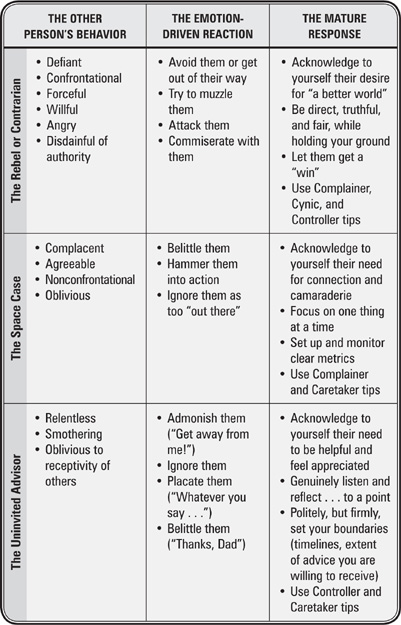
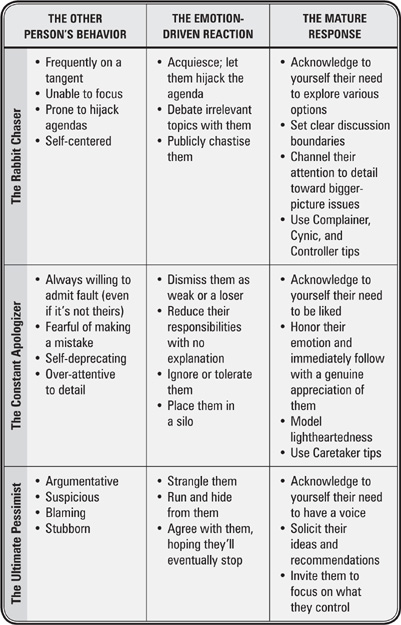
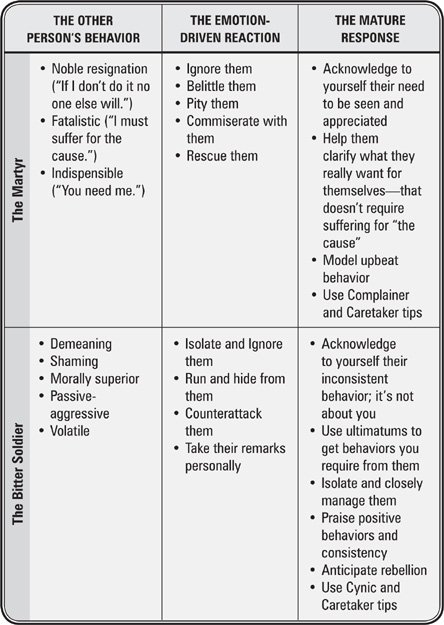
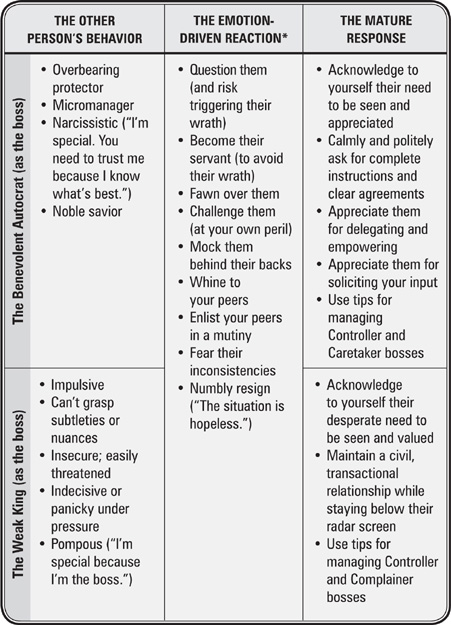
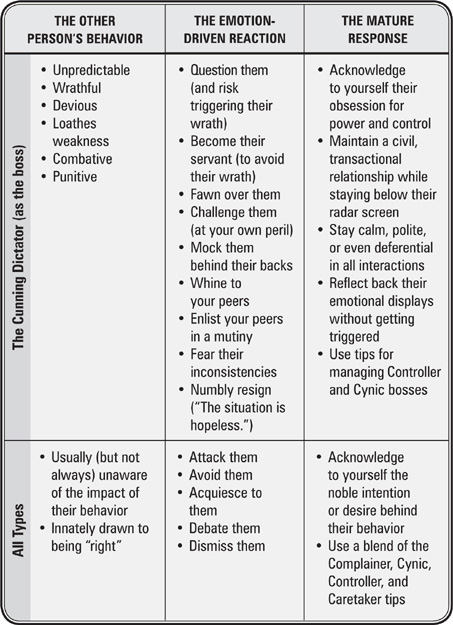
* The emotion-driven reactions to The Benevolent Autocrat, The Weak King, and The Cunning Dictator bosses are similar.
APPENDIX B
THE DRAMA SELF-ASSESSMENT
If youre serious about displaying authenticity in the workplace, take the following Drama Self-Assessment. For each drama-based behavior shown in the table, place a check mark in the column that reflects the frequency with which this behavior shows up in your life. Then, invite two or more of your work associates to evaluate you. Compare their assessments with how you see yourself. An expanded online version of this assessment that allows for others to evaluate you may be found at www.DramaFreeOffice.com .
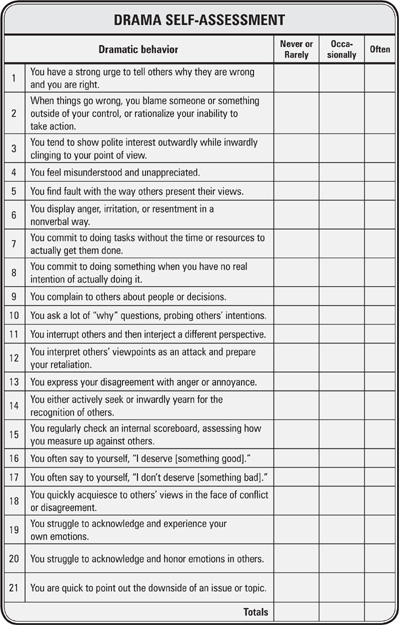
Scoring: Each Never or Rarely counts as zero; each Occasionally counts as 1; each Often counts as 3. Compute the total. A total of less than 12 indicates reasonably mature behavior. If both your self-assessment and others assessment of you is in this range, youre likely capable of guiding others into more authentic behaviors. A total thats between 13 and 20 indicates some sabotaging behaviors that will hamper authenticity in your relationships. A total greater than 20 indicates a high likelihood of ongoing drama-based behavior.
ONLINE TOOLS FOR
ASSESSING THE AUTHENTICITY
OF YOUR OFFICE
The authors have developed a suite of online assessments designed to evaluate the levels of authenticityand levels of dramaof individuals in several workplace environments, including:
Executive teams
Partnerships
Family businesses
Work groups or project teams
Other small groups (e.g., Young Presidents Organization forums and other accountability groups)
These online assessments offer an optional 360 component (i.e., evaluations of a single individual by multiple coworkers, such as subordinates, peers, or superiors in the organization). They are an ideal complement to an organizations annual review process.
Next page

